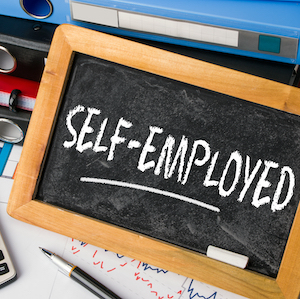How to Get a Mortgage When You're Self Employed

Buying a home in New Hampshire can be daunting for anyone, but it’s notoriously challenging when you’re a self-employed borrower because it’s not as easy to prove you’ve got a steady income.As with all mortgages, your application will be evaluated based on four different criteria called the 4 C’s of mortgage lending: cash, credit, collateral, and capacity.
There are two unique challenges for self-employed business owners, freelancers or 1099 contractors.
1. Tax returns for the two most recent years
Mortgage lenders have no choice but to average income from your two most recent years tax returns. Keep in mind we are not averaging your business’s gross revenue. We are averaging your personal taxable income after your deductions. You can qualify with as much as 50% of your qualifying income going toward debt. This is called a “debt-to-income” ratio, or DTI. If your application qualifies for automated underwriting, you may only need one year of income tax documents to prove your income. If your income is trending upward, this will help you to qualify for more loan, because your income doesn’t have to be averaged over a two-year period.
2. Good credit score
Mortgage rates are largely based upon your credit score. The electronic underwriting systems used for Fannie Mae and Freddie Mac programs require higher credit scores for self employed borrowers. To get the best possible rate, you’ll need a middle FICO score of 740 or higher. There are exceptions, but you’ll want to have a score of 640 just to be approved.
What you can do to improve the chance of qualification:
1. Work on improving your credit score. According to the Repositories, the fastest and easiest ways to maximize your credit score include the following:
- Make sure your credit card balances don’t exceed 30% of their high credit limit. That is the sweet spot for the highest possible credit score.
- Don’t apply for new credit during the months leading up to a mortgage application. The inquiry and resulting new debt affect your risk profile and your credit score.
- Don’t close any revolving (credit card) accounts. Available lines or credit are a financial buffer that reflect favorably on your risk profile
- Pay accounts on time
2. Separate your business accounts from your personal accounts. Make sure you have an established business operating account and be careful not to commingle your business expenses with personal ones. Use your business account to pay your business debts: credit cards, truck loans, equipment loans, commercial mortgage, etc. We won’t count business debt against you personally if you can prove your business pays it with 12 months of cancelled business checks.
3. Manage your tax deductions wisely. We understand you want to maximize your deductions to minimize what you pay Uncle Sam. Just know when you get overly aggressive with your deductions, it’s going to cost you in a different way, by lowering the amount of loan you qualify for. Please consult a financial advisor for tax deductibility.
We’ve been helping self-employed borrowers qualify for mortgages for more than 20 years. We can help you determine the following:
• What price range you can qualify for
• Which mortgage programs best meet your needs
• How much cash you need
• What the monthly payment will be
If you have questions and want to know if you can qualify, contact Charley at (603) 471-9300 or send an email to ask a question, or if you're ready to proceed click on either of the links below to get started. Your information will be kept completely private.
NOTE: Be sure to have a PDF or picture of your two most recent tax returns (1040s, schedules, and W-2s) in hand to upload as you fill out the application.
Check out our article on mortgage documentation alternatives.
Watch this three-minute video with Charley's top tips for qualifying for a mortgage when you're self-employed.
Be sure to have a PDF or picture of your two most recent tax returns (1040s, schedules, and W-2s) in hand to upload as you fill out the application.

